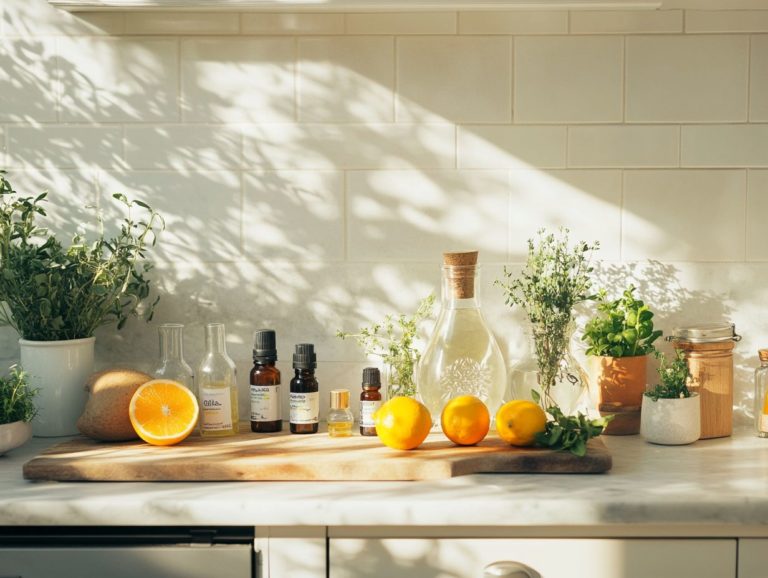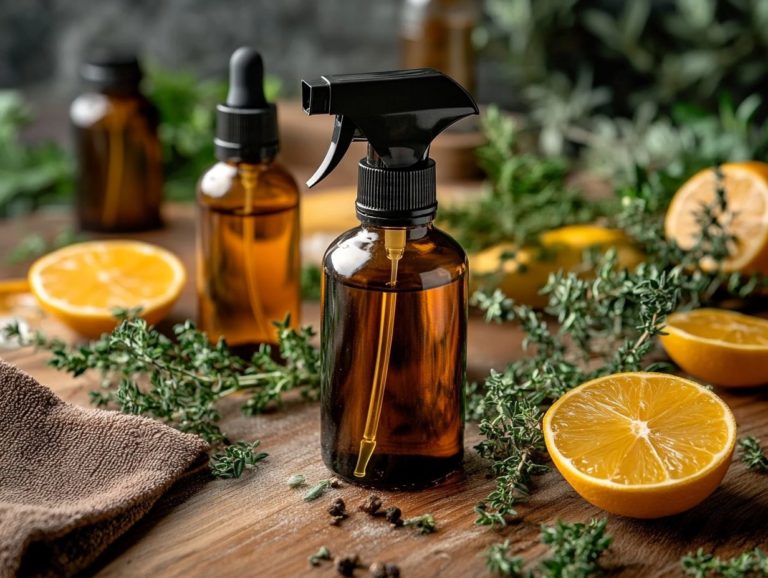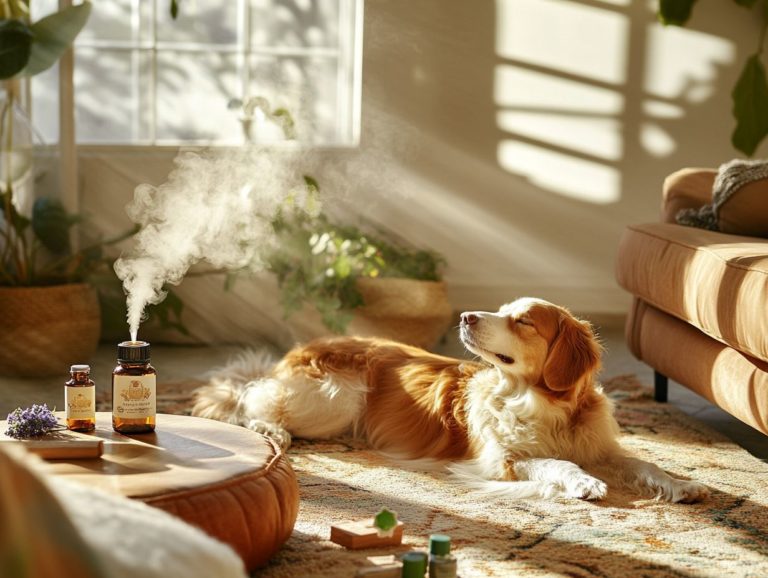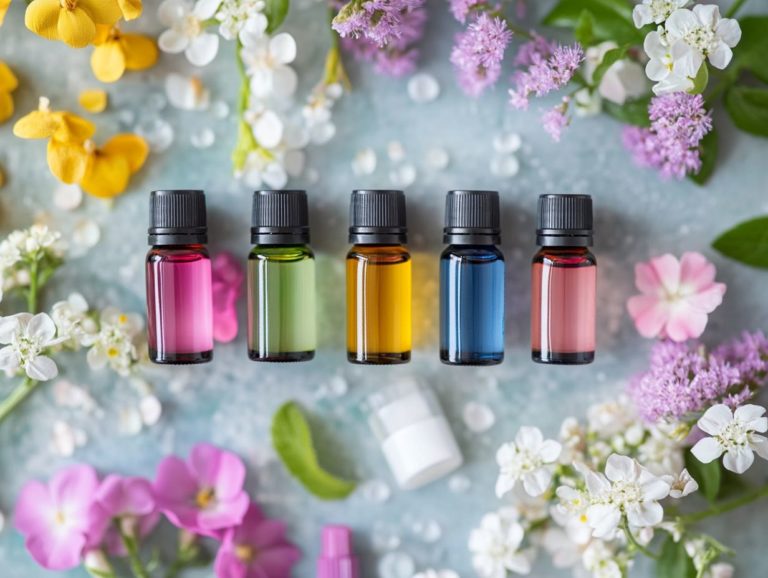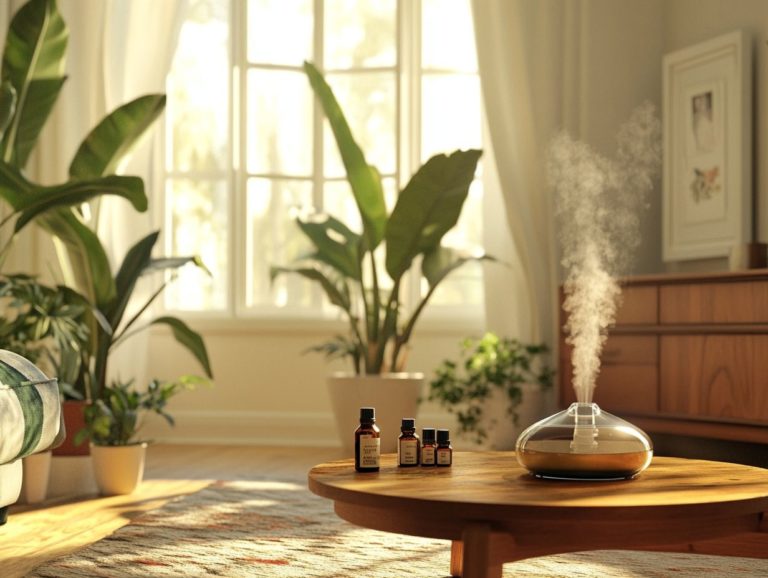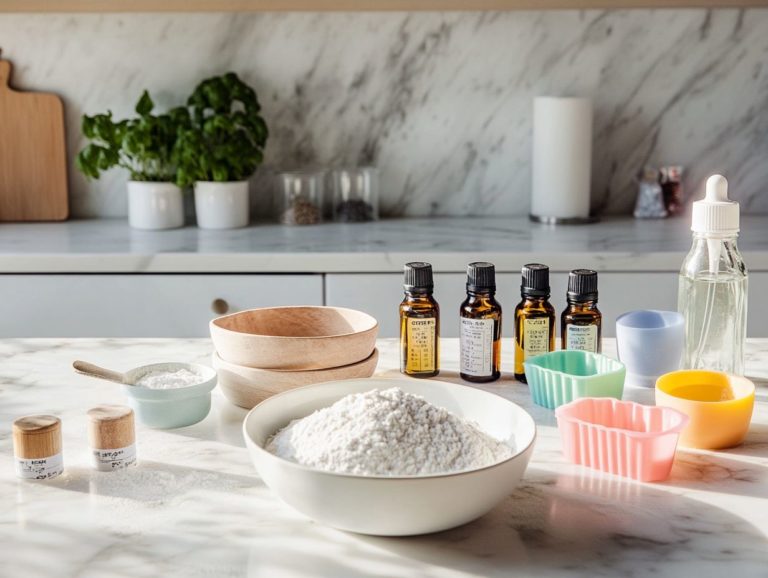DIY Glass Cleaner with Essential Oils
Are you weary of relying on commercial glass cleaners laden with harsh chemicals? Crafting your own glass cleaner at home not only saves you money but also allows you to tailor the scent and effectiveness to perfectly suit your preferences!
Let s dive into the simple ingredients you need to get started right away! This guide will walk you through the essentials for a DIY glass cleaner, featuring staples like white vinegar and essential oils. You ll discover amazing advantages of utilizing natural scents in your cleaning routine.
Expect step-by-step instructions, essential safety tips, and inventive essential oil combinations that will keep your windows sparkling and your home smelling delightful.
Immerse yourself in this healthier, eco-friendly alternative to elevate your cleaning regimen!
Contents
- Key Takeaways:
- Why Should You Make Your Own Glass Cleaner?
- What Are The Ingredients Needed To Make A DIY Glass Cleaner?
- What Are The Benefits Of Using Essential Oils In A Glass Cleaner?
- How To Make A DIY Glass Cleaner With Essential Oils?
- What Are Some Essential Oil Combinations to Use in a Glass Cleaner?
- Are There Any Safety Precautions When Using Essential Oils In A DIY Cleaner?
- How To Use The DIY Window Cleaner?
- How To Store The DIY Window Cleaner?
- 1. Store In A Cool, Dark Place
- Frequently Asked Questions
- What is DIY Glass Cleaner with Essential Oils?
- What ingredients do I need to make DIY Glass Cleaner with Essential Oils?
- Why should I use essential oils in my glass cleaner?
- How do I make DIY Glass Cleaner with Essential Oils?
- Can I use any type of essential oil in my DIY Glass Cleaner?
- Is DIY Glass Cleaner with Essential Oils Safe to Use?
Key Takeaways:
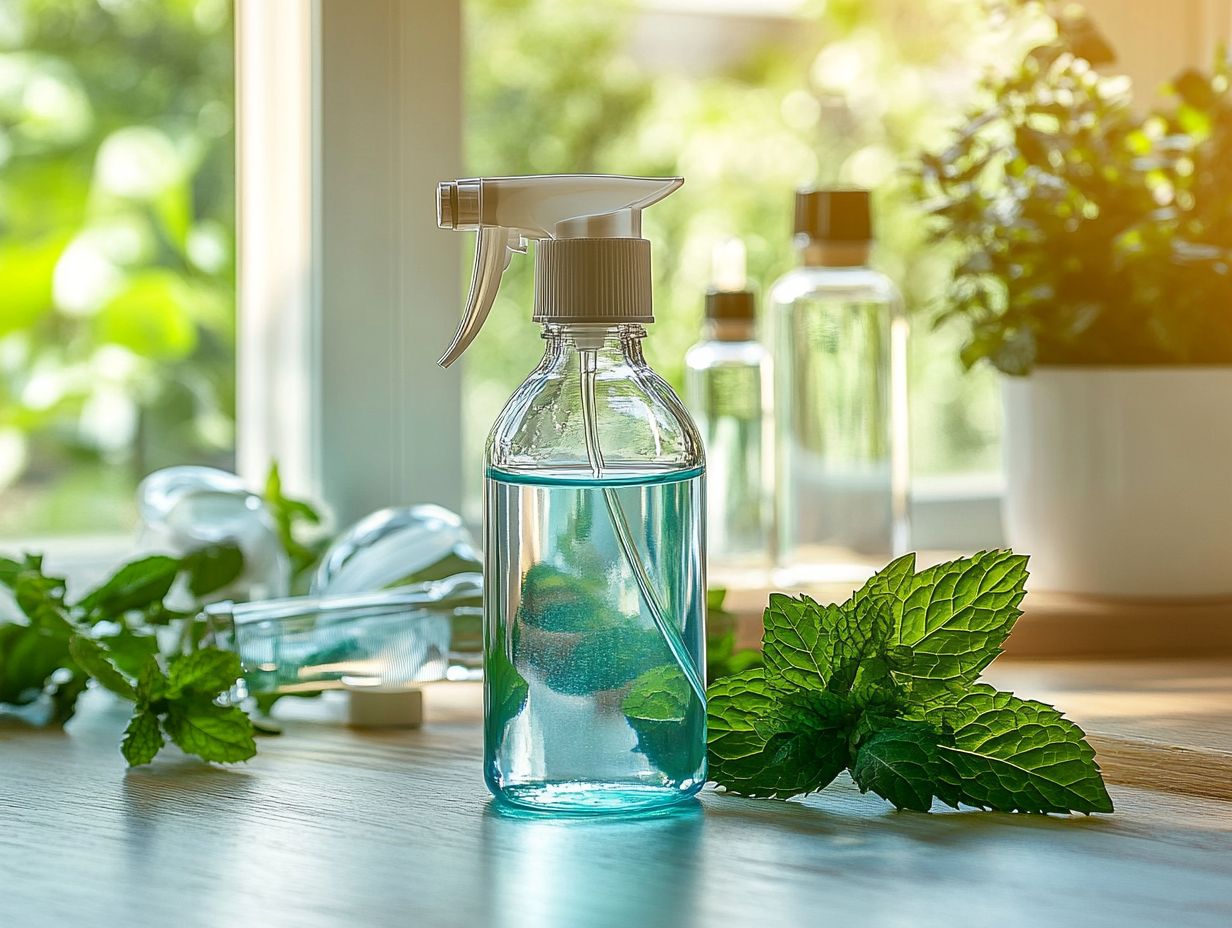
- Making your own glass cleaner is cost-effective and environmentally friendly.
- Essential oils add a pleasant scent and have natural antimicrobial properties.
- Combine oils like lemon with lavender or tea tree with orange for a refreshing cleaner.
Why Should You Make Your Own Glass Cleaner?
Creating your own glass cleaner is cost-effective and eco-friendly. It also gives you control over the ingredients in your cleaning products.
Unlike many commercial cleaners, which often contain harmful chemicals, a homemade glass cleaner can be easily made with simple household items like white vinegar, rubbing alcohol, and essential oils safe and effective options that work wonders!
This DIY approach not only allows you to tailor the cleaner to your specific preferences but also ensures a sparkling finish that is safe for everyone in your home, including children and pets.
What Are The Ingredients Needed To Make A DIY Glass Cleaner?
To craft an effective DIY glass cleaner, you’ll require just a few simple ingredients that are likely already in your home. The key components are white vinegar, which serves as a natural cleaner; rubbing alcohol, which helps you get a streak-free shine; and distilled water to help dilute the mixture.
For an extra touch, consider adding essential oils like lemon, orange, or grapefruit. Not only do these oils infuse a delightful scent into your cleaner, but they also enhance the overall cleaning power of your solution.
When combined, these ingredients create a natural household cleaner that will leave your windows and mirrors gleaming, without a streak in sight!
1. White Vinegar
White vinegar is your go-to ingredient for many homemade cleaning recipes, especially when it comes to crafting a DIY glass cleaner that effortlessly cuts through grime and eradicates streaks. This natural household powerhouse isn t just easy on the wallet; it’s also eco-friendly, making it a top choice for those who prefer to steer clear of toxic chemicals in their cleaning routines.
Thanks to its acetic acid content, white vinegar boasts the ability to dissolve mineral deposits and break down dirt, leaving surfaces gleaming without the harshness of conventional cleaners. You’ll find that a simple mixture of equal parts white vinegar and water can conquer everything from greasy stovetops to tarnished windows, delivering a remarkably clean finish that impresses!
But the benefits don t stop there! The antimicrobial properties of white vinegar also add an extra layer of protection by inhibiting the growth of certain bacteria, providing yet another compelling reason to include it in your environmentally conscious cleaning strategy. With a variety of natural options at your disposal, this budget-friendly cleaner stands out as a dependable choice for achieving a spotless home while prioritizing safety and sustainability.
2. Rubbing Alcohol
Rubbing alcohol is essential when crafting an effective glass cleaner. It offers a quick-drying solution that keeps pesky streaks at bay. This versatile ingredient amplifies the cleaning power of your DIY concoction and doubles as a disinfectant. This ensures your surfaces are not just clean but also free from harmful bacteria.
Incorporating rubbing alcohol into your glass cleaner elevates its overall effectiveness. It works wonders in dissolving grime and oily residues. This compound significantly enhances your cleaner s ability to fight germs, making it an excellent choice for high-touch areas like windows and mirrors, where germs tend to thrive.
Thanks to its rapid evaporation rate, surfaces dry quickly, leaving a streak-free finish that boosts both clarity and shine. By using rubbing alcohol, you promote cleanliness while enjoying the peace of mind that comes with knowing your surfaces are both visually appealing and hygienically safe.
3. Distilled Water
Distilled water is an essential ingredient in many cleaning solutions, including your homemade glass cleaners. Its remarkable purity and absence of minerals make it ideal. By using distilled water, you ensure your DIY glass cleaner leaves no mineral deposits or unsightly spots on the glass surface, resulting in a pristine, streak-free finish.
This type of water enhances the effectiveness of your cleaning agents, as it interacts more efficiently with soaps and detergents. Choosing distilled water reduces the likelihood of residue buildup and fosters a healthier cleaning routine by avoiding contaminants commonly found in tap water. This is particularly crucial for homes with sensitive surfaces or materials.
Incorporating distilled water into other cleaning solutions like those for your appliances and various surfaces can greatly extend their longevity and performance. By embracing distilled water in your cleaning efforts, you set the stage for superior results and a more sustainable approach to maintaining your space.
4. Essential Oils
Incorporating essential oils such as lemon, orange, and grapefruit into your DIY glass cleaner not only infuses your space with delightful fragrances but also elevates its cleaning power. This results in a non-toxic cleaner that doubles as a refreshing air freshener. These citrus oils boast natural antibacterial properties, effectively combating germs while leaving your surfaces sparkling clean.
By harnessing the remarkable benefits of these essential oils, you can create a blend that transforms mundane chores into enjoyable experiences. This promotes a healthier living environment. The antimicrobial properties in essential oils like tea tree and lavender enhance the product s efficacy, ensuring that harmful bacteria are eliminated with every swipe.
The invigorating scents uplift your mood, making cleaning feel less like a chore and more like a rejuvenating activity. Embracing these natural solutions nurtures a sense of well-being and reduces your reliance on chemical-laden commercial products, paving the way for a more sustainable lifestyle.
What Are The Benefits Of Using Essential Oils In A Glass Cleaner?
Incorporating essential oils into your glass cleaner unlocks a wealth of benefits. These oils elevate both the efficacy and sensory pleasure of your cleaning experience. They infuse your cleaning solution with enchanting fragrances and bring along natural antimicrobial properties.
This combination creates a powerful non-toxic cleaner that ensures safety for your home and loved ones. Transform your routine into a delightful affair!
1. Natural Scent
Incorporating essential oils into your cleaning products offers a primary advantage: the natural scents that can transform your mundane chores into a more enjoyable experience. Whether you opt for lemon, orange, or grapefruit essential oil, each one adds a refreshing aroma that lingers long after the cleaning is complete.
These naturally derived fragrances do more than mask odors; they elevate the entire cleaning experience, turning what could feel like a chore into an engaging and relaxing activity. The invigorating scents of essential oils not only uplift your mood but also foster a sense of well-being, making your spaces feel more inviting and comfortable.
When you combine these aromatic benefits with their antimicrobial properties, you create a holistic approach to cleaning. This method appeals to both your senses and hygiene standards. It s no wonder so many people are joining the trend of transforming their cleaning routine with these delightful alternatives, embracing the fresh and vibrant atmosphere they bring to their homes.
2. Antimicrobial Properties
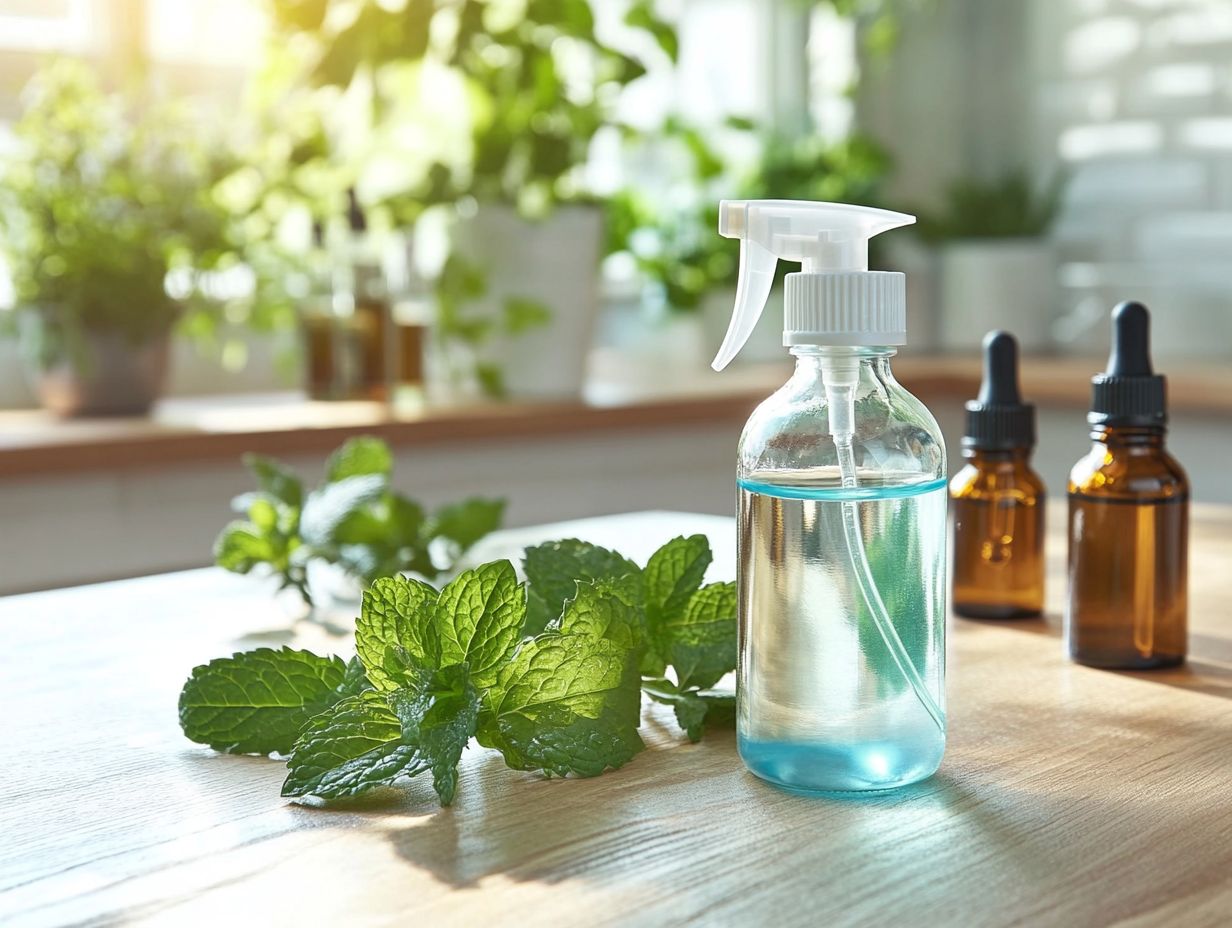
Essential oils are celebrated for their antimicrobial properties, which means they kill germs and bacteria, making them a remarkable addition to your DIY disinfectants and glass cleaners. Oils like tea tree and eucalyptus stand out as particularly effective in tackling germs and bacteria, ensuring your surfaces are not just clean but genuinely hygienic.
Lavender and lemon essential oils also offer impressive antimicrobial benefits. Lavender oil, with its calming scent, not only disinfects but also helps create a soothing atmosphere, while lemon oil s natural acidity cuts through grease and grime, delivering a powerful and refreshing clean. Additionally, incorporating orange essential oil or grapefruit essential oil can provide further cleaning power with their citrus properties.
Incorporating these oils into your daily cleaning routine can dramatically reduce harmful pathogens in your home, fostering a healthier environment for you and your loved ones. Plus, these essential oils leave behind a delightful aroma, enhancing your cleaning experience without the need for harsh chemicals. This transformation creates a powerful, natural household cleaner that ensures a safe and pleasant environment.
3. Non-Toxic
Incorporating essential oils into your cleaning routine allows you to craft non-toxic cleaning products that are safe for you and your loved ones. Unlike many commercial cleaners packed with harmful chemicals, a homemade glass cleaner featuring essential oils offers a natural alternative that is both effective and safe.
These non-toxic options not only reduce the risk of allergic reactions but also foster a healthier living environment. By using essential oils like tea tree, lavender, or lemon, you can tap into their antibacterial and antiviral properties, ensuring your surfaces are impeccably clean without the harsh side effects tied to traditional products. This makes them ideal for cleaning windows and cleaning with kids.
Creating DIY solutions is not only budget-friendly but also gives you the power to customize your own delightful scents while significantly lowering your environmental footprint. Embracing these natural ingredients showcases your commitment to sustainability and health, proving that effective cleaning can harmonize beautifully with eco-conscious choices. Additionally, using simple ingredients like white vinegar and baking soda can lead to affordable cleaner solutions.
How To Make A DIY Glass Cleaner With Essential Oils?
Crafting your own DIY glass cleaner with essential oils is not only simple but also incredibly rewarding, leaving your windows and mirrors gleaming with clarity. To craft your DIY glass cleaner, follow these steps:
- Gather your supplies: white vinegar, rubbing alcohol, distilled water, and your preferred essential oils.
- Use an amber glass spray bottle to preserve the potency of the essential oils.
Try making your own DIY glass cleaner today and enjoy a cleaner, healthier home!
1. Gather Supplies
Let s get started right now! To craft your own DIY window cleaner, first, gather all the necessary supplies:
- White vinegar
- Rubbing alcohol
- Distilled water
- Essential oils
- Measuring cup
- Amber glass spray bottle
Having everything ready ensures you can create an effective and eco-friendly glass cleaner without a hitch. Consider using household ingredients like cornstarch to enhance your cleaner’s effectiveness.
White vinegar serves as a natural cleanser that cuts through grime while delivering a streak-free shine. Rubbing alcohol helps to evaporate moisture quickly, preventing pesky spots from forming. Distilled water is essential as it avoids mineral deposits that can mar your glass. For a delightful fragrance and extra antibacterial properties, consider adding essential oils like lemon, orange, or lavender.
Don t forget to use a measuring cup for precise ratios, enhancing the solution’s effectiveness. An amber glass spray bottle not only provides safe storage for your cleaner but also protects the ingredients from light, keeping them potent. A microfibre cloth works wonders for achieving a streak-free finish.
2. Mix Ingredients
Once you ve gathered your supplies, it s time to mix the ingredients in the right proportions for your cleaning solution. A straightforward recipe calls for:
- One cup of white vinegar
- One cup of rubbing alcohol
- Two cups of distilled water
You can also add a few drops of your favorite essential oils to create an affordable and effective cleaner.
Begin by using a clean spray bottle to prevent contamination. Pour the ingredients into the bottle, starting with the vinegar. This will help dissolve dirt and grime thanks to its cleaning power. Next, add the rubbing alcohol, which serves as a powerful disinfectant, effectively eliminating germs and bacteria. Gradually incorporate the distilled water to dilute the mixture while maintaining its cleaning prowess.
For an aromatic touch, include about 10-15 drops of essential oils, like tea tree or lavender. Not only do these oils add a delightful fragrance, but they also bring antibacterial qualities to your cleaner. Finally, give the bottle a gentle shake to ensure everything is thoroughly combined, resulting in a safe and effective cleaning solution perfect for various surfaces around your home. This cleaning hack is an excellent addition to your cleaning tips arsenal!
3. Transfer To Spray Bottle
After mixing your cleaning solution, transfer it carefully into an amber glass spray bottle. This protects those precious essential oils and keeps them effective! Plus, it provides a convenient dispenser for applying your DIY cleaner to various surfaces, particularly for cleaning mirrors and other reflective surfaces.
Using an amber glass spray bottle is a game-changer for anyone who values the longevity and potency of their cleaning products. The dark glass serves as a protective barrier against harmful UV rays, extending the shelf life of your natural ingredients.
To safely transfer your mixture, ensure that both the bottle and any funnel you may use are clean and dry. Pour the solution carefully to minimize spills, and don t forget to label the bottle for easy identification later. This helps maintain an organized set of cleaning supplies.
For optimal effectiveness and safety, store your DIY cleaning products in a cool, dark place. This will give you the confidence to maintain a healthy environment, knowing that your creations are working their best. Now that you have your cleaner ready, get those windows sparkling!
4. Shake Well Before Use
Before you reach for your DIY glass cleaner, shake that bottle well! This step is crucial for blending all the ingredients. Essential oils can separate, and shaking ensures you achieve optimal cleaning performance every time you spray. It s a key step in any window cleaning routine.
Skipping this simple yet vital action risks uneven distribution of the cleaning agents, leading to disappointing streak-free results. Shaking prevents essential oils from settling at the bottom, ensuring each spray has the intended cleaning power.
This little practice activates the ingredients vinegar, dish soap, and water boosting their effectiveness against grime and smudges. A well-shaken mixture enhances performance and extends the life of your DIY cleaning solution, making each application more effective and economical. For those who prefer a vodka substitute, it can be used in place of rubbing alcohol for a similar effect.
What Are Some Essential Oil Combinations to Use in a Glass Cleaner?
Exploring various essential oil combinations can transform your glass cleaning routine, offering distinctive scents and enhanced cleaning benefits. For example, blending lemon essential oil with lavender creates a refreshing aroma while boosting the cleaning power of your DIY glass cleaner. These combinations lead to a sparkling clean finish and offer multiple essential oil benefits.
Other delightful combinations to consider are:
- Peppermint and eucalyptus for a refreshing scent
- Tea tree and orange for a powerful natural disinfectant
1. Lemon and Lavender
Combining lemon and lavender essential oils creates a delightful fragrance that enhances your cleaning experience while giving your glass cleaner strong cleaning power. Lemon is known for its natural degreasing abilities, while lavender adds a calming scent that can improve your mood during cleaning sessions. This cleaning recipe shows how natural ingredients can create an effective glass cleaner.
These oils work together to tackle stubborn stains and smudges on glass surfaces. The acidity of lemon dissolves dirt and grime, making it your ideal ally for achieving a streak-free shine. Lavender s natural antibacterial properties contribute to a healthier environment by reducing harmful microorganisms. This combination also effectively removes streaks.
This blend not only leaves your glass shining but also turns a mundane chore into a more enjoyable experience. The refreshing scent of lemon lifts your spirits, while the soothing notes of lavender create a serene atmosphere, turning cleaning into a moment of self-care rather than just another task on your to-do list. Using these oils in your DIY disinfectant spray provides a pleasant cleaning experience.
2. Peppermint and Eucalyptus
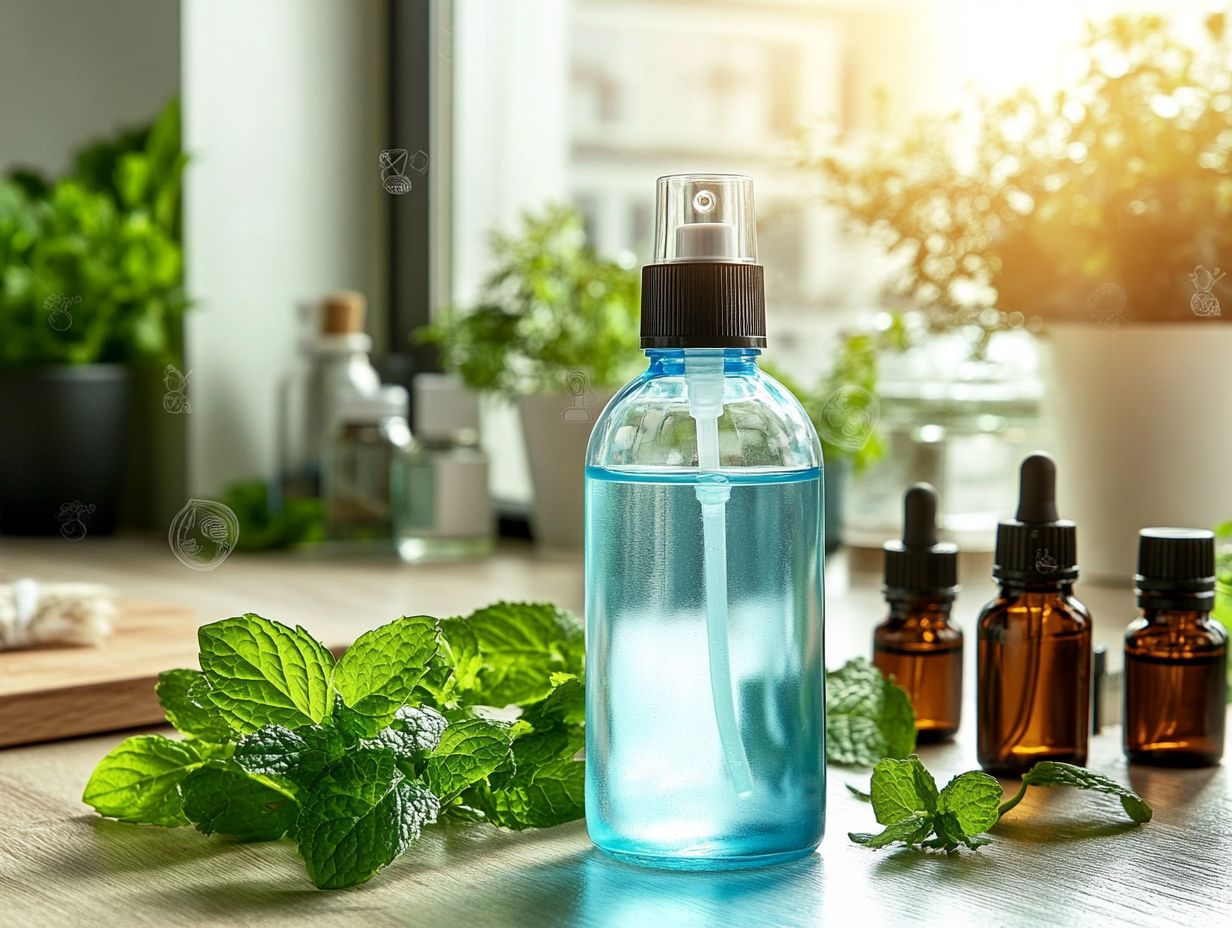
The invigorating blend of peppermint and eucalyptus essential oils offers a refreshing scent that energizes your cleaning routine while providing remarkable antimicrobial properties. This dynamic combination helps eliminate germs and leaves your surfaces smelling delightfully fresh and clean. It’s a great choice for a natural disinfectant.
Incorporating these oils into your glass cleaner means they tackle dirt and grime effectively, all while uplifting your mood with their aromatic charm. Peppermint contributes a cool, sharp fragrance that stimulates the senses, transforming cleaning from a mundane task into a rejuvenating experience. This blend works wonders in the kitchen too!
Eucalyptus adds a soothing, herbaceous note that promotes relaxation, beautifully balancing the energetic qualities of peppermint. Together, they create a fragrant synergy that elevates ordinary cleaning into a therapeutic ritual, ensuring your home looks pristine and feels invigorating and welcoming. This is a great way to incorporate cleaning hacks into your routine.
3. Tea Tree and Orange
The combination of tea tree and orange essential oils can be a strong addition to your cleaning routine. Tea tree oil is known for its strong antibacterial properties. It makes an ideal choice for a homemade disinfectant.
On the other hand, orange oil brings a fresh, citrusy scent. This scent not only deodorizes but also cuts through grease and grime effectively. Together, they create a powerful cleaning solution that helps prevent the spread of germs while leaving your home smelling fresh and clean.
A harmonious blend of tea tree and orange essential oils offers you a strong natural disinfectant that’s ideal for your homemade glass cleaner. Tea tree oil is celebrated for its ability to fight germs, while orange essential oil adds a delightful citrus aroma. This mixture is not only effective but also a pleasure to use.
This remarkable synergy elevates your cleaning routine and contributes to a healthier indoor atmosphere. Tea tree oil expertly battles bacteria, fungi, and viruses. It tackles even the toughest grime to ensure your surfaces remain hygienic.
Meanwhile, the invigorating scent of orange essential oil lifts your spirits. Its natural grease-cutting abilities enhance the cleaning potency of the blend. This makes it an effective glass cleaner that both disinfects and removes streaks.
When used together, these oils transform a mundane cleaning chore into a refreshing ritual. They effortlessly eliminate harmful pathogens without relying on harsh chemicals.
Are There Any Safety Precautions When Using Essential Oils In A DIY Cleaner?
Using essential oils in your homemade glass cleaner offers many benefits. However, it s imperative to follow specific safety precautions for a secure cleaning experience. Essential oils, like lemon and grapefruit, are strong and require careful handling.
These oils are highly concentrated and can lead to skin irritations or adverse reactions if mishandled. Therefore, follow the recommended guidelines carefully when crafting and using your DIY cleaner.
1. Avoid Direct Contact With Skin
When incorporating essential oils into your DIY glass cleaner, it s crucial to avoid direct contact with your skin. Certain oils can cause irritation or allergic reactions.
Using household items like rubbing alcohol, white vinegar, and cornstarch can enhance your cleaning recipe. Always wear a pair of gloves when handling concentrated essential oils. Ensure your cleaning solution is well-diluted before application.
For added safety, use a funnel or dropper when adding essential oils to your mixture. This minimizes spillage and keeps your workspace tidy.
When using distilled water in your homemade cleaning products, precision is key. If you re experimenting with a new oil, perform a patch test. Simply apply a small, diluted amount to a discreet area of skin to monitor for any unfavorable reactions.
Choose oils like lemon or lavender, known for their cleaning properties. While exploring these delightful scents, prioritize safety by keeping these substances away from the skin. Store them properly in a cool, dark place to preserve their effectiveness. Citrus oils like orange and grapefruit also add a refreshing scent to your DIY disinfectant spray.
2. Keep Cleaning Products Away From Children and Pets
It s crucial to keep your DIY window cleaner, especially those infused with essential oils, safely out of reach of children and pets. This prevents any accidental ingestion or exposure.
Make it a habit to store your cleaning products in a secure location, ideally in a locked cabinet. This ensures they remain inaccessible to curious little hands and paws.
Labeling all containers clearly is advisable. This eliminates any confusion about their contents. Consider using child-proof caps and regularly check your storage areas to ensure they stay secure.
For added precaution, always apply your essential oil mixtures in well-ventilated spaces. Never leave them unattended after use. It’s essential to understand the potential risks associated with essential oils; they can be strong and sometimes harmful to young ones and furry friends if not handled correctly.
Creating a safe environment encourages responsible cleaning practices. It also provides peace of mind for families. This ensures a non-toxic cleaner that s safe for everyone in the household.
3. Do Not Ingest
When using essential oils in your glass cleaner, a critical safety precaution to remember is to ensure that none of the cleaning solution is ingested. These oils are strong substances, and even a small amount can be harmful if swallowed.
It s essential to keep all cleaning products clearly labeled and out of reach. Using child-resistant packaging can further prevent accidental ingestion. Misuse can easily happen, especially in homes with children or pets, where curiosity can lead to perilous situations.
Unlike standard cleaning agents, essential oils can cause serious health issues, such as stomach problems or even respiratory problems, if consumed. This highlights the necessity for proper storage; it’s wise to keep these powerful substances in locked cabinets. Always label your homemade cleaning products clearly to prevent any misuse.
Manufacturers also have a role to play by providing clear and informative labeling. This should indicate the potential risks associated with ingestion and offer guidance on safe usage. Promote awareness and use safe practices to reduce hazards linked to essential oils.
How To Use The DIY Window Cleaner?
Ready to achieve sparkling clean windows? Utilizing your DIY window cleaner is a simple yet effective process that can result in brilliantly clear windows and mirrors with minimal effort on your part. This homemade cleaning product is easy to make and ensures a streak-free cleaner every time.
To apply the cleaner, spray it generously onto the glass surface and then wipe it down using a clean microfiber cloth. Microfiber cloths are excellent for trapping particles and ensuring a streak-free finish.
For that flawless, streak-free finish, take a moment to buff the surface with a dry cloth, ensuring that every corner is meticulously attended to and left spotless.
1. Spray On Glass Surface With DIY Cleaner
Begin by generously applying your DIY window cleaner to the glass surface you intend to refresh, ensuring an even distribution across the entire area. This initial layer allows the cleaner to penetrate and dissolve any grime or dirt that may have settled over time.
Using simple ingredients like white vinegar, rubbing alcohol, and distilled water can enhance your cleaning solution. Keep a steady hand while spraying. Avoid oversaturating any spot to prevent unsightly streaks.
After the cleaner has been applied, give it a moment to sit this brief pause allows it to tackle those stubborn spots effectively. This window cleaner recipe is particularly useful for cleaning windows and mirrors without leaving any streaks.
You may notice that some areas require a little extra care, so keeping a microfiber cloth nearby is a wise choice. This will enable you to gently wipe down the surface, ensuring optimal absorption of the cleaner and that no detail is overlooked.
The trick is to find the right balance in your application, ensuring the solution works its magic without drenching the glass. This method guarantees brilliant clarity and a streak-free finish that will truly impress you!
2. Wipe With A Clean Microfiber Cloth
Next, take a pristine microfiber cloth and begin to wipe the glass surface in a circular motion, effectively lifting away dirt and grime. Microfiber cloths are particularly suited for this task, as they are designed to trap particles without scratching the glass.
This technique not only guarantees a streak-free finish but also helps prolong the lifespan of the surface you re cleaning. The unique structure of microfiber fabric enables it to absorb moisture and capture dust more efficiently than traditional cleaning cloths.
By steering clear of harsh chemicals, you create a safer environment while achieving crystal-clear results. These versatile cloths can be washed and reused multiple times, minimizing waste and saving you money in the long run.
Therefore, incorporating microfiber cloths into your cleaning routine emerges as both an effective and eco-friendly choice. This makes it an affordable cleaner option that s both efficient and sustainable.
3. Buff With A Dry Cloth For A Streak-Free Finish
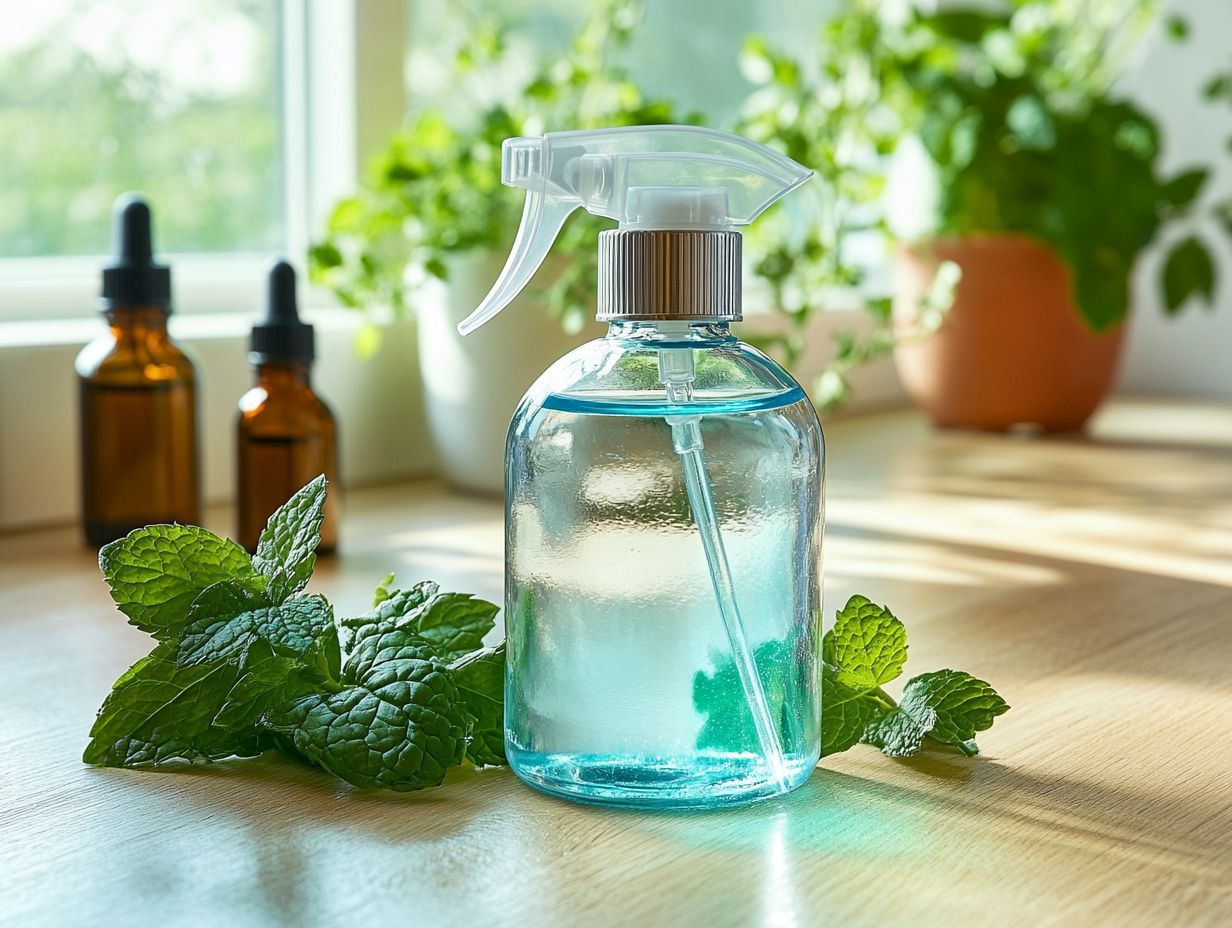
To achieve that flawless, streak-free finish, buff the glass surface with a dry cloth after wiping it down with your DIY glass cleaner. This final step is crucial! It leaves your windows and mirrors shining brightly.
Buffing is very important. It enhances clarity and shine while banishing unsightly streaks that can compromise the overall look. To get the best results, select the right type of cloth. Lint-free cotton cloths or microfiber cloths work best.
Microfiber cloths, made of tiny fibers, trap dirt and moisture effectively without risking scratches on the surface. Lint-free cotton cloths are also great, ensuring no pesky fibers are left behind.
Use a separate cloth for buffing to maintain cleanliness and maximize your efforts for a streak-free look. These cleaning hacks ensure that each window cleaning session results in clear glass.
How To Store The DIY Window Cleaner?
Proper storage is key to ensuring the effectiveness and longevity of your DIY window cleaner. Use an amber glass spray bottle for your cleaning solution. This protects the natural plant extracts from light exposure that can compromise their quality over time.
Store your cleaner in a cool, dark place to enhance its preservation. This way, you can enjoy sparkling results whenever you need them.
1. Store In A Cool, Dark Place
To extend the shelf life of your DIY window cleaner, keep it in a cool, dark space, away from harsh sunlight and heat sources. This thoughtful storage helps preserve the essential oils and other ingredients, ensuring your cleaner remains effective longer.
Keep the solution in a tightly sealed container to prevent evaporation and contamination. Store it in a cool cabinet, where it stays consistently at a stable temperature ideal for maintaining your cleaner’s effectiveness.
Avoid placing your cleaner near heat-emitting appliances, such as ovens or dishwashers, as temperature fluctuations can compromise the formula. Regularly inspect your cleaner for any signs of separation or changes in smell, which could signal that it s lost its potency.
By following these careful guidelines, you can ensure that your homemade glass cleaner retains its effectiveness for extended use, making your cleaning routine seamless and efficient. For an even more powerful solution, consider making a DIY multi-surface cleaner with essential oils. Try these tips today for a cleaner home!
2. Use Within 1-2 Months
For the best results, use your DIY glass cleaner within 1-2 months of making it! This ensures you re getting maximum effectiveness. Even though the ingredients are natural, essential oils can lose their potency over time, so regular use is key to maintaining a fresh and effective cleaning solution. Using a microfibre cloth helps achieve a streak-free finish.
As the weeks go by, the performance of your homemade glass cleaner may diminish. Factors like exposure to light and air can degrade the main cleaning ingredients. White vinegar, a staple in these cleaners, tends to lose its effectiveness beyond the two-month mark, and other natural additives might also see a decline in their cleaning power.
Keep this timeframe in mind! An ineffective cleaner can leave streaks and residue on your glass surfaces, undermining its intended purpose of delivering clarity and shine. Consider adding a bit of cornstarch to your cleaning solution to help remove streaks. Label your cleaner with the preparation date to ensure you use it at its best, and make it a habit to whip up a fresh batch every couple of months. Using household ingredients ensures you have an affordable cleaner at hand.
Frequently Asked Questions
What is DIY Glass Cleaner with Essential Oils?
DIY Glass Cleaner with Essential Oils is a homemade cleaning solution that utilizes the natural cleaning power of essential oils to effectively clean and shine glass surfaces.
What ingredients do I need to make DIY Glass Cleaner with Essential Oils?
To make DIY Glass Cleaner with Essential Oils, you will need white vinegar, distilled water, rubbing alcohol, and your choice of essential oils such as lemon, lavender, or tea tree oil. You might also consider adding a bit of cornstarch or using vodka as a substitute for rubbing alcohol. White vinegar cleans and removes streaks, while rubbing alcohol helps the mixture evaporate quickly.
Why should I use essential oils in my glass cleaner?
Essential oils not only have natural cleaning properties, but they also add a pleasant scent to your glass cleaner without the use of harsh chemicals or artificial fragrances! Citrus oils like orange and grapefruit are particularly effective.
How do I make DIY Glass Cleaner with Essential Oils?
To make DIY Glass Cleaner with Essential Oils, mix together 1 cup of distilled water, 1 cup of white vinegar, 1/4 cup of rubbing alcohol, and 10-15 drops of your preferred essential oil. Pour the mixture into a spray bottle and shake well before each use.
Can I use any type of essential oil in my DIY Glass Cleaner?
Yes, you can use any type of essential oil in your DIY Glass Cleaner, but some oils may have stronger cleaning properties than others. Citrus oils, such as lemon or orange, are great for cutting through grease and grime, while lavender and tea tree oil have antibacterial properties. Adding a few drops of Thieves Cleaner can enhance the cleaning power and add a disinfectant quality!
Is DIY Glass Cleaner with Essential Oils Safe to Use?
You can use DIY Glass Cleaner with Essential Oils safely! Always test it on a small area before applying it to larger surfaces.
Be cautious when using essential oils around pets and children, as some oils may be harmful to them. Essential oils are concentrated plant extracts that can add pleasant fragrances and cleaning power.
Using non-toxic, natural options makes this cleaner suitable for households with kids. Get started with this eco-friendly cleaner today!

